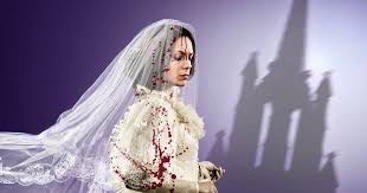 The Overture played by the wonderful Welsh National orchestra under the fine hand of, ever popular, conductor Carlo Rizzi, its dramatic percussion and lyrical violins prepare us well for the passionate high drama and moments of deeply felt beauty that are to follow.
The Overture played by the wonderful Welsh National orchestra under the fine hand of, ever popular, conductor Carlo Rizzi, its dramatic percussion and lyrical violins prepare us well for the passionate high drama and moments of deeply felt beauty that are to follow.
Once again the WNO chorus demonstrates its high international reputation as it sings with a strong commitment to each of the roles it has to play.
Sicily is occupied by a French army: the chorus with their shining breast plates and red tunics stand firm. As the subservient Sicilians in drab torn grey clothes they are very much the underdogs. They bring their fine musicality to both of the roles.
The French are under the leadership of cruel Governor Guy de Montfort, we are given a very sinister and threatening performance by Giorgio Caoduro’s piercing baritone, that note of threat is very clearly impressed upon us.
Hélène, an Austrian Princess who supports the Sicilians is very keen to get rid of the French; de Montfort murdered her brother. She is teased into singing by the French soldiers. This gives us the opportunity to hear Anush Hovhannisyan’s remarkable and beautiful soprano. She is also a very fine actor. She urges the Sicilians to fight back at the French occupying army.
We get more quality singing from Jung Soo Yun, Henri whose fine tenor voice comes right from his heart. But his heart is dedicated to Hélène they plan to marry but….
Proceda lands on the shore. He has returned from exile: played very realistically by Wojtek Gierlach he sings with fervour his joy at being home, “O thou Palermo, adored land…”
De Montfort sends out an invitation to a dance. Henri refuses to go, he is arrested and dragged away.
Director David Pountney embraces the tradition of Grande Opera and introduces several spectacular dancing sequences, performed by members of the National Dance Company of Wales. One of the dancers emerges from a coffin and the exciting spectacle continues and delights.
De Montford receives a letter with one piece of information that causes a big change in the way he conducts his affairs. Particularly with Henri who he now treats with an uncharacteristic kindness.
Unaware, Henri stands at the prison gates waiting to be admitted. He sings movingly of the difficulties his friends are in, “Day of weeping, of fierce sorrow”. De Montford orders the execution of Hélène.
As she is led to the execution he pardons her and joins Henri and Hélène hands in marriage and pardons the Sicilians rebels, and the bells ring out. But this is a signal for the Sicilians to fall upon the French and they defeat them
The Sicilian vespers has been lifted and morning is bright. We have seen some of the worst and some of the best side of human behaviour.
|

Privacy Policy | Contact Us | © keith morris / red snapper web designs / keith@artx.co.uk